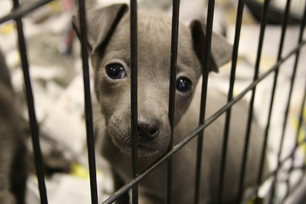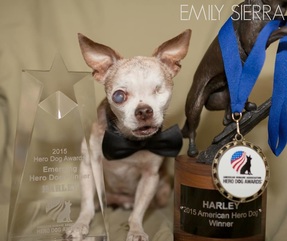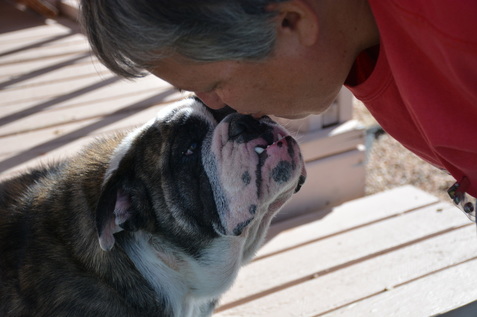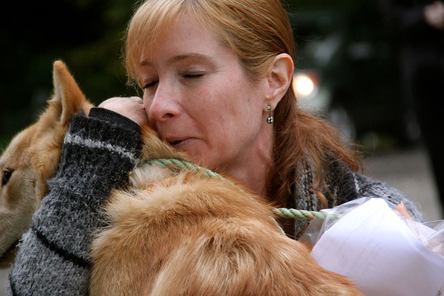 We hear the phrases all the time: "Adopt! Don’t Shop!" and "Don’t Breed or Buy While Shelter Dogs Die!" In a perfect world more people would adopt animals from shelters and rescue groups and that would be the go-to option for most families. In that same perfect world, the only dog breeding taking place in our country would be done by responsible breeders who are in it not for the money, but to perpetuate breed standards (as compared to modifying breeds to the point where it is abusive and the dogs either cannot walk or cannot breathe). Ours is not a perfect world. A lot of people get dogs who come from puppy mills or huge dog breeding operations because they are either blinded by the cuteness they see or they don’t want to know where the dog came from or a combination of the two. There are, in fact, responsible breeders out there, none of whom would ever sell a dog in a pet store or in a Walmart parking lot. I know there are those who oppose all dog breeding. I simply do not because I think that’s unrealistic. I oppose irresponsible breeding and breeding with a focus on profit and with little or no regard for the well-being of dogs. We in rescue and advocacy tell the public one thing all the time: do not buy a dog from a pet store. Do not, do not, do not. We tell them that when they buy that cute puppy in the window, they are only perpetuating an industry which enslaves dogs in conditions that would make us sick if we saw pictures or actually went there. We also tell them to not buy dogs from web sites, newspaper ads or street corners and to engage in due diligence in dealing with local breeders to determine the conditions from which the dog came to make sure they are not inadvertently supporting a mill operation. In essence, we are zero tolerance when it comes to people buying puppy mill dogs. We encourage them to "just say no" and we judge people harshly who cave in to that cute little face in the pet store and who buy the puppy, sometimes for thousands of dollars.  But what about how we behave as rescuers and advocates? Are we really any better than the public we are so quick to judge? Most of the people I know in rescue are those I would describe as purists. They either pull animals from animal shelters (most of which are kill facilities) to adopt them out to the public or they take animals directly from the public in order to find them new homes. In many cases they are taking the harder-to-place animals as opposed to younger or "cuter" animals and they function based solely on donations and with no taxpayer assistance. These people are surely aware of the concept of a dog auction but they have never attended one and would never even consider going to one. There is a faction in the rescue community, however, which engages in behavior which is not only as bad as buying a dog from a pet store, but is in some ways much, much worse as far as I'm concerned: I’m talking about rescuers who buy dogs at auction. I first touched on this topic very briefly in a blog I wrote in late July which caused quite a bit of uproar from people who don’t agree with me. I was on the receiving end of some pretty strong hostility and a lot of accusations. I’m okay with that. I will not be bullied. My opinions are my own and while I love dogs, my opinions on the topic of rescuers at dog auctions is based on reason and logic and not on my emotional attachment to dogs. I want to be perfectly clear on this subject. As much as those in rescue and advocacy circles are zero tolerance for people who buy a puppy from a pet store, I am equally zero tolerance when it comes to rescuers who pay large amounts of money for dogs at auction and call it "rescue." It is not. I’m not sure exactly what to call it other than a purchase, but it is not rescue. For me, it actually borders on a form of either collecting behavior at the worst and "ego rescue" at the least. I know that saying this will not be popular with many in the rescue community. So why bother? I’m saying it because I think it needs to be said, both for the benefit of some in the rescue community who can be reached and for the benefit of those who donate to rescues, thinking they are doing a good thing by helping a rescue group buy dogs at auction. (click on image to view as a .pdf file)  In order to present my position on this topic more thoroughly, I reached out to some of my subject matter experts on the topic. These are people who have decades of collective experience in dealing with the puppy mill issue. They are rescuers and advocates with ties not only in the Amish community but in the dog breeding and dog auction community. They are active in seeking legislation related to mills and they are working hard to educate the public about how their behavior relates to changing or ending the mill industry. If you are a rescuer who is absolutely convinced that it is a great idea to solicit donations to buy dogs at auction, it is unlikely that reading this blog will change your opinion. So be it. If you are a person who has donated money to a rescue so the rescue can buy dogs at auction, you surely did so with the best of intentions. I just ask you to step away from your behavior long enough to consider what it is you really think you are achieving when you buy dogs at auction. The highlights of the input I received from my contacts are as follows. • Rescuers have changed the landscape of dog auctions. As recently as 10 years ago, the presence of rescuers and rescue groups at dog auctions was not the norm in most regions. Most of those present at auction were breeders who were at the auction to buy dogs to add to their businesses. That changed not quite 10 years ago in the Great Lakes region and about 6 years ago in the Midwest. Rescuers had an increasing presence at auction and were often easy to spot from the way they dressed, the way they behaved and the amount of money they were willing to spend on dogs. During this time, it was not uncommon for some in rescue get dogs for free, get "dollar dogs" or to get large numbers of dogs for small amounts of money (i.e., 50 dogs for $3. Yes you read that correctly). The presence of rescuers at auction is now extremely obvious to both the auction companies and to the breeders who are both fascinated by and repelled by the rescuers’ behavior. • The presence of rescuers at auction has completely changed the auction process itself. The rescuers are often paying more for dogs than the auction houses have ever seen before, and in some regions dogs are now brought to auctions with the sole purpose of being sold to rescues. Rescues have created a niche market of sorts due to their obvious presence at auction. They usually come with large sums of money and often announce their intent to "save" dogs "no matter what," sometimes focusing on specific breeds of dogs they favor. • The amount of money rescuers are paying for dogs at auction bears no relation to the amounts breeders are willing to pay for dogs at auction. In one auction, a rescuer paid $9,000 dollars for a female dog and her puppies. It is not uncommon for a rescue group to pay $30,000 to $40,000 at auction for 5 to 10 dogs. This willingness of rescuers to pay such large amounts of money truly leaves the auction houses and breeders laughing all the way to the bank. They don’t talk about it while the auction is taking place or while the rescuers are within hearing range. That would be foolish. They absolutely talk about it after the auction ends and transactions are finalized. The behavior or rescuers is also viewed with disdain by many breeders, some of whom are second or third generation "farmers" who are trying to make a living to pay their bills. For them, spending a thousand or more dollars for a single dog at auction is offensive. Breeders have been known to call the big money spent by rescuers at auction "disgusting" even though the economic benefit to them is obvious. • The types of dogs bought by rescuers at auction may surprise most people. There are some in rescue who have developed relationships with breeders and auction houses which enable them to get dogs who are older or injured for free or for some nominal amounts of money. Most rescuers, however, are buying pregnant dogs, dogs who have just given birth and younger, more appealing dogs, including puppies. They are not buying dogs who are older, injured or sick and who are actually in most need of rescue. Rescuers who pay big money for the "best" dogs are essentially cutting out the middleman in the sales process. They negate the need for a broker to market the dogs to a store or the need for a store to sell the dog since they are getting dogs directly from the source. In the process of doing that, they make the sale more profitable. • On a scale of 1 to 10, the behavior of rescuers at auction related to advocacy efforts to end puppy mills is a 10. When rescuers buy dogs at auction for large sums (as opposed to seeking relinquishment of dogs to them for no cost), they are paying way more than any breeder would pay and they are simply providing more funding to breeders (and the auction house) to make milling operations larger and more profitable. The argument that buying a dog at auction prevents a breeder from profiting off that dog is one-sided and completely avoids the reality of the business aspects of breeding dogs for profit. When a rescuer pays $2,000 for a dog which would ordinarily sell for $20 or even $200, they may have removed that dog from the breeding operation, but they have put more money in the breeder’s pocket to buy even more dogs and make even more money. • When asked my contacts what rescuers should be doing instead of buying dogs at auction, I was provided with this input which I have paraphrased: Rescues should avoid auctions completely. They should contact breeders and ask them to relinquish the dogs that they are done with, including the old dogs, sick dogs, disfigured dogs and puppies that they cannot sell. NO money should change hands. The rescues can then raise funds to provide the medical care these dogs will need. Only then will they truly be saving dogs. Dog auctions are a tragic embarrassment to our society and to humane-minded citizens. We have been asked if people should "buy" or "rescue" dogs at auction. Buying at auctions simply means that it will be profitable. If it is profitable, it will continue and more dogs will be bred for sale at future dog auctions. We understand compassion for the dogs being sold and know that there will be some who will buy. We understand both sides of the situation. We hope that in the long run, not buying will produce the best outcome to end these auctions altogether. Rescuers who buy dogs at auction should take a long, hard look at what they hope to accomplish. They should look at the "why" of what they are doing and ask themselves, "what is the grander plan for these dogs?" Anyone who is willing to pay $9,000 for a puppy has an ego problem. They will never be able to recoup the money paid for that dog and they have paid a breeder much, much more money that the dog may be worth to another breeder. As far as people who donate to rescues who buy dogs at auction, they should ask themselves how much good could be done with that same money to help dogs in other ways and while working to educate the public about why they shouldn’t buy mill dogs. They should consider how much good could be done to care for older, more challenged dogs obtained from breeders for free and to give them a good life. There are three kinds of rescuers: rescue as a business, rescue for ego and rescue as purity. Buying dogs at auction is not good business and it is not pure rescue. It is a purchase and it is more about ego than it is about helping dogs. When you rescue for ego, you are putting yourself before the welfare of dogs and you are putting your personal need to feel important in the way of slowing or ending the very industry you say you oppose. I believe that at the heart of every true rescuer is a desire to save animals and give them a better life. I also believe that those who donate to rescues presume that their money will be used in the best possible way to help the most animals in need. That’s how I view the donations I make. It’s time to stop enabling the puppy millers and the commercial dog breeders who treat dogs as a farm commodity to be bred, sold and bought like equipment, cotton or corn. We do that not only when we persuade the animal-loving public to say "no" to buying mill dogs. We do it when those in rescue walk away from the auction tent and focus on helping other dogs in need, educating the public and promoting legislation which changes our society related to the commercial farming of dogs. If you are a rescuer and you feel absolutely compelled to save dogs at auction, please don’t go there with your bankroll in hand and a determination that you will outspend anyone who gets in your way. Take the time to develop and foster relationships with the breeders and the auction companies so that you can arrange to have older, injured or challenged dogs relinquished to you for free. By doing that you are helping the dogs who need you most, you are not making the dog breeding industry more profitable and you staying true to the pure form of "rescue" which your donors no doubt expect from you. And then you can go back to the very important business of educating the public and supporting legislation at local, state and federal levels which seeks to make life better for mill dogs until the day that puppy mills become part of our shameful past. (images courtesy of Hector Parayuelos, Nicole Mays, PetShopPuppies and National Mill Dog Rescue) NOTE: I have continued to receive comments on this blog almost five years after I first published it which disagree with my opinion and criticize my logic. I am no longer taking comments on this blog.
If you are a rescue group that buys at auction, you are a broker and you must be licensed by the USDA for that purpose. If you support a rescue group which goes to auctions and buys dogs, ask yourself why the rescue is not saving dogs from shelters and from the public who may need help while at the same time engaging in political efforts to modify the dog breeding industry. I see soliciting donations to buy dogs at auction as a form of emotional blackmail. You can try to categorize the purchase of dogs at auction as honorable. I do not agree. It is harmful. More then two years after I published this blog, a very thorough article in the Washington Post covered it in much more detail, based on years of research. I encourage you to read that article to educate yourself.
1 Comment
 I have long believed that there are two kinds of people who share their lives with companion animals. The first type of people have pets because they like them and it's nice to have them around. They may say that they love them, but the relationship is not really one of commitment. Animals run away, animals get hit by cars, life happens and when times get tough, it's really not a big deal to either place the animal with someone else, give the animal away or take them to an animal shelter. The second type of people share deeper bonds with their animals who are true members of the family. These people see their relationship with their animals as one of long-term commitment and they are prepared to live up to that commitment no matter what life brings. These people would no sooner give away or surrender a pet than they would give away a child. Because our animals are childlike in their dependence on us and their needs, I feel pretty strongly about our responsibilities toward them. I think that anyone who brings an animal into their life must take that decision seriously and be prepared to care for that animal for the duration of his or her life. I am pretty much zero tolerance when it comes to people who tell me that their dog or cat is precious to them, but they have to give them up because of ___________ (fill in the blank). The excuses range from I don’t have time or the dog won’t listen or the cat refuses to use the litter box or we’re having a baby or some other reason. I was in a pet supply store once and saw a flyer for a gorgeous dog which read “New home needed immediately! Moving to Minnesota!” I grunted and asked the woman at the counter, “what? Do they not allow dogs in Minnesota?” I just think that having pets equates to making a promise. You don’t give away your relatives, you don’t give away your children and you don’t give away your pets or, worse yet, surrender them to an animal shelter where they may be summarily destroyed. If they mean so little to you, please. Just don't get a pet or become a foster for a homeless pet instead.  In spite of my zero tolerance for people who treat pets like an old lamp or a used sofa, I am well aware that there are times when people simply cannot keep their pets even though they do love them deeply. People get sick. People die. People lose jobs. Houses burn down. In those instances, my personal hope is that some family member or friend will step up to take that beloved pet (or pets) so that the person giving them away doesn’t lose all contact with them. It could be that they get well or get a new job or get a new place to live, after which their animal can be given back to them. In cases there that cannot happen or does not happen, my secondary hope is that the community in which that desperate person lives is a no kill community so that a local animal shelter or rescue group can help re-home the animal and the person can be assured that their pet’s life is not at risk. People who are going through hard times have enough to think about without worrying about whether their dog or cat will live or die. I also recognize that animals often are incompatible with other animals in a household and need to be re-homed for their own well-being. I have no issue with this at all. I would much prefer that a pet be placed into a new and more compatible home for the benefit of everyone, human and animal. If you consider yourself someone who has a true, committed relationship with your pets, I think that there is one more thing you can do for them which you may not have done already. I'm talking about finding a Petparent. Even if you have the best of intentions for your animals, life does happen and events are often entirely unexpected. Do you know what would happen to your pets if you ended up in the hospital for an extended period of time? What if you died? What about if your house burned down or you lost your job? How about if you ended up in a dire financial situation either due to overwhelming medical bills or some act of fraud? We hear all the time of animals needing homes because someone died or got cancer or became so incapacitated that they were simply not able to care for their animals at all. Much like people may have a Godparent for their children, I want you to consider doing the same for your companion animals. As much as your family and friends love you, you simply cannot assume that they will willingly take in your pets if the unexpected happens. This can’t just be some wishy-washy assumption that someone you are related to or someone you know will step in and help. It has to be a direct conversation with someone in your life to get them to commit to taking your animals and keeping your promise to those animals in the event you no longer can. I’m not suggesting you have anyone sign a contract. I am suggesting that you have a face-to-face chat or serious telephone conversation in which you get a commitment from at least one person that they will care for your pets if you die or become so ill you cannot keep them. Ideally this person will be someone very close to you whom you can trust. Make sure that person knows about the health condition of your animals, who your veterinarian is (in order to get copies of records if needed) and that you tell them about your pet's needs and personality. If something happens to you unexpectedly, it is up to you to minimize the trauma to the animals you love. You do that by making solid plans for their care so that they can transition into a new home as easily as possible. I know that planning for the worst is uncomfortable for us. The idea of having a will or an advanced directive for our own health care is difficult for us. But if you love your companion animals, you'll make a plan and you will have a true Petparent. You'll sleep better at night knowing you have kept your promise. (images courtesy of Digna Oliveras, Becky Lynn Tegze and Peace & Paws Rescue)
 I engage with a lot of animal welfare advocates across the country on a variety of issues. I've had conversations with advocates in multiple states recently about two issues I consider our national shame related to companion animals: puppy mills and killing in animal shelters. The two issues may seem unrelated, but they are absolutely related. The puppy mill industry produces millions of dogs each year, infusing them into the supply system as a result of public demand. The public has been bamboozled into believing pure bred dogs are superior to mixed breed dogs or dogs in our sheltering system and has confused cost with value or worth. At the same time those dogs are being marketed as superior, we are destroying great dogs in our antiquated animal sheltering system, often just for space or convenience. This continued slaughter of dogs using our money simply serves to perpetuate the stereotype that something is wrong with them and that we have no choice but to destroy them. Wrong, wrong, wrong. Beyond this connection between puppy mills and shelter killing is issue of what is being done about both problems. A lot of people think that national animal welfare organizations are working hard to eradicate the evils of the puppy mill industry and working hard to reform our tax-funded shelters. Not so much. There is some good being done by what I call the alphabet soup of animal welfare (since most organizations are known by acronyms we all use to describe them). But the truth is this: the greatest good being done across our country to bring awareness to the topic of puppy mills is being done by grassroots advocacy, by the people "in the weeds" of putting this topic on the public radar. The same is true for the animal shelter issue. If you seek reform of your local animal shelter, don't look to a large, national organization for help. Your best help and support is going to come from other advocates like you who can guide you regarding effective advocacy. We will bring an end to shelter killing when enough of the public knows what is taking place behind closed doors using their money and while they are blamed for the process. We will bring an end to puppy mills when enough of the public knows what takes place in the supply chain before that cute puppy ends up in that pet store, on the internet or in that newspaper ad. So, what can you do about puppy mills? The answer is pretty simple: Just Say No. • Say no to dogs in pet stores. Even if you are told they come from a USDA licensed kennel, they are from a puppy mill. When you buy a dog in a store, you are simply creating demand and are making the industry profitable. • Say no to dogs on internet websites. It is easy to make a good looking website while having the dogs live in absolute squalor and while receiving no veterinary care. If you believe a website is run by a reputable breeder, do your due diligence to learn more about that breeder to determine how many litters they produce each year and about the health of their dogs. • Say no to dogs in newspaper ads. While some reputable breeders do use newspapers to sell dogs, they are ordinarily very transparent about how they function if they are legitimate. Make plans to meet the parent dogs, see the conditions in which the dogs live and ask questions about how many dogs are sold each year. • Say no to dogs in store parking lots. It is easy for someone who is running a backyard breeding operation which would horrify you to bring a box of cute puppies to a parking lot near you and spin some tale about a dog who got loose, resulting in an unexpected litter. It is very likely that you are supporting a milling operation which the person selling the dogs does not want you to see. If you think the person is being honest, ask so see the parent dogs and the conditions in which they live. • Say yes to adopting a puppy or a dog from an animal shelter or rescue group. You will have saved a life and you’ll get a wonderful companion in the process.  If you want to get involved yourself on a grassroots level and become part of the advocacy effort taking place across our country, consider getting involved with Harley's Puppy Mill Action and Awareness Project. Harley was the 2015 American Hero Dog and while he is no longer with us, his family is continuing his legacy by promoting grassroots advocacy across the country by small groups of people just like you in order to change our culture. Some of the most productive conversations in our country about puppy mills are taking place not in conference rooms but in grocery store check-out lines, at banks, at parks, at social gatherings and on airplanes as animal advocates look for opportunities to talk about puppy mills and help educate the people around them about the evils of the industry. If you want a wearable conversation starter to make your advocacy easier, please consider supporting the Just Say "No" To Puppy Mills campaign going on now with Bonfire. All proceeds will go directly to Harley's Puppy Mill Action and Awareness Project and you'll be spreading awareness effortlessly. The shirt design was donated by the very talented Morgan Spicer of Bark Point Studio. Thank you so very much, Morgan! Sometimes a shirt is more than just a shirt. It is a way to start a dialogue with others who may tell even more people as we turn the tide on the mill industry and take back the power for the sake of the dogs we say we love and value. Just say No. (image subject to copyright of Bark Point Studio and Rudi Taylor)
I am considered the resident "animal person" where I work. I am known to be outspoken in my advocacy and that means people come to me for advice on a host of issues like re-homing a pet due to a death in the family, finding a lost pet, where to get the best prices for spay and neuter, which local rescue groups are the best, "what do we do about the bat hanging on the outside of the building," etc. I'm no expert on any of these topics, but I do try to steer people in the right direction while perhaps teaching them something in the process. I had an inquiry from a co-worker recently about getting a new-to-him dog in the wake of the passing of a beloved dog. My response was immediate: get a senior. Our attachments to animals are emotional and involve chemistry, so a lot of people gravitate to animals based on appearance or based on assumptions about future behavior. The reality of our culture is that people often get pets from breeders, stores or websites because they equate cost with value or worth and they believe animals from sources other than shelters and rescues are somehow superior. The flip side of that negative bias is that people assume that since animals die in shelters in all but our most progressive communities, they must somehow be damaged or broken. Neither or those assumptions is true. Animals in shelters are there due to no fault of their own and many may very well have been someone's beloved pet. When it comes to animals adopted from shelters, our other reality is that people tend to gravitate toward younger, cuter animals while overlooking animals who are older. In honor of Adopt a Senior Pet Month, here's my pitch for why you should adopt a senior animal. My personal hope is that some day after I retire, I'll adopt only senior pets and work to give them the best years of their lives. They deserve nothing less.  What You See is What You Get. All puppies are cute, but it can often be difficult to tell how large they will grow and what kind of personalities they will have as adults. The same is true for kittens. When you adopt a senior pet, you know exactly what you are getting in terms of size, color and general physical condition. Some senior pets require a period of time to decompress from the circumstances which led them to you, but good shelters and rescues can tell you a lot about the animal's behavior and temperament so you know more about what to expect. Many animals adopted from rescue groups have been in foster homes so the group can tell you a lot about their personalities. The vast majority of animals adopted from shelters and rescues are also fully vetted so you know about their health and they come to you spayed or neutered, vaccinated and microchipped. Seniors are more mellow and predictable. As cute as a puppy may be, the reality is that they take a lot of work. They need structure and boundaries. We are responsible not only for teaching them our language, but learning how to understand the body language they use to communicate with us. Puppies can be destructive when bored and can be mouthy when playing. Even young cats can have a destructive side and can keep you up at night with nocturnal play. A senior dog or cat has been there done that and is simply going to be a more mellow addition to your household. Many senior animals have spent years living with a family and are socialized to people. Senior dogs may know basic commands and may very well be house trained. Even if an older dog is not house trained, many are very easily trained in a short period of time. All dogs and cats need exercise and mental stimulation but your senior pet just needs less to keep him or her entertained. Most senior pets don't require the same level of monitoring or training that younger animals require so they're a good choice for busy families with young children, for older people or for people with disabilities.  Older Dogs (and Cats) Can Learn New Tricks. Training a puppy or a young dog can take a lot of time, effort and repetition. You have to be consistent and help the dog learn what behaviors are expected and which are not appropriate. This includes involving all members of your family, including your children. Adult dogs and cats are simply more focused and learn fast. If your senior dog needs to learn about how to function in your family, you can enroll him or her in an obedience class or consult with a behaviorist so you can learn how to read your dogs' behavior and how you can be a good pack leader. Although people perceive that cats cannot be trained due to their independent nature, most can be trained to follow basic instructions. You Still Have Plenty of Time With Them. Whether or not a dog is a senior is based on breed and size. In general, the larger the breed or size of the dog, the shorter the life span. Many large breeds are considered "senior" by the age of 6. Many smaller breeds are considered senior by the age of 10. Most cats are considered senior between the ages of 7 and 10. Regardless of the age of the senior, older pets still have plenty of great years left. If you get a medium sized dog who is 6 years old, he or she may have 10 good years left. If you get an 7 year old cat, he or she may have more than 10 years with you. You can talk to your veterinarian about ways to keep your senior dog or cat happy and healthy for many years after your lives together begin.  Older Pets are Great for Seniors. A lot of older people don't get new pets because they worry about their ability to care for them for the entire life span of the pet. A dog or cat can live from 10 years to 20 years and some older people are worried that their pets may outlive them. When seniors adopt seniors, it can be a perfect fit. The older person gets an animal who is more mellow and who is more content to just spend time together and the animal gets a new life in a more mellow household where companionship is the focus of the relationship. Many animal shelters have Seniors for Seniors Programs in which adoption fees are either waived or greatly reduced and with programs in place to re-home an adopted pet if something happens to their adoptive family. Be a Hero, Save a Life. Older dogs and cats are often overlooked in shelters and end up being destroyed in all but the most progressive communities even though they are perfectly healthy. When you adopt a senior animal, you are quite literally saving that animal's life. If you have ever loved a animal into their old age, think about what a tragedy it would have been if that animal had never been given an opportunity to live out their last years in comfort. Although you may have fewer years together than with a puppy or kitten, your rescued senior may enhance your life in ways you never imagined. The health benefits of pets is well documented - they lower our blood pressure, reduce our stress levels and provide us with unconditional love that we rarely provide each other as humans. Older pets somehow just seem to know that you have done a good thing to help them and you may find yourself bonding with a senior much faster than you would with a younger animal. (images courtesy of Dana Kay Mattox Deutsch)
|
AuthorI am an animal welfare advocate. My goal is to help people understand some basic issues related to companion animals in America. Awareness leads to education leads to action leads to change. Archives
July 2024
Categories
All
image courtesy of Terrah Johnson
|





 RSS Feed
RSS Feed